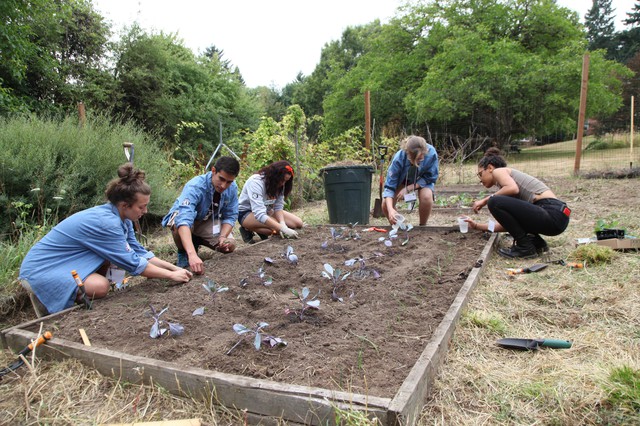FoodCorps Members Serve Lessons On Nutrition And Food
About 240 FoodCorps AmeriCorps service members gathered in Portland for a week to learn about gardening, nutrition, and cooking in the classroom.
About 240 FoodCorps AmeriCorps service members gathered in Portland for a week to learn about gardening, nutrition, and cooking in the classroom.


Elizabeth Miller, Oregon Public Broadcasting
On the campus of Lewis and Clark College in Portland, Jenna Mobley starts a lesson on worms with an icebreaker. She asks all of her students to introduce themselves and their favorite vegetables.
Each student introduces themselves. Hannah loves beets, Richard loves peas.
But these aren’t 5th graders – the age group the lesson was created for. The students are adults, and they’ll soon be the teachers at schools around the country.
They are part of FoodCorps, a grantee program of AmeriCorps, that sends service members out into schools and communities to teach kids about food.
The weeklong training brought about 240 people from around the country to Portland, where they learned about gardening, nutrition and cooking in the classroom. Now they’ll head to service sites in 18 states for about a year.
“We’re filling a niche that there just isn’t somebody else able to do around bringing food and academics together,” said Zeke Smith, vice president of programs for FoodCorps, which is primarily headquartered in Portland.
A FoodCorps experience may look different from one community to the next. A service member might be teaching lessons about worms in the classroom. Or in the cafeteria, hosting broccoli taste tests. Or hosting an after-school program in the garden, helping kids grow their own onions and cabbage.
But Smith said it’s about more than learning to cook or grow food.
“It’s also a different way for them to bring their community into the school and to think about the school as a community space,” Smith said.
That means talking about the culture associated with a food or cuisine, or about how it relates to students lives. For example, a training session on making spring rolls prompted conversation on where the dish originated.
In the weeklong training, FoodCorps members learned basic lessons around food and gardening. But for some, the training provided an opportunity to learn about more complex teaching concepts – like restorative justice and trauma-informed care.
“We want to make sure that we’re supporting our service members to integrate effectively into the school community that they’re going in,” Smith said. “That means knowing more than just content.”

FoodCorps in the News: 2024

FoodCorps’ Statement on the 2024 Election

FoodCorps Welcomes Rachel Willis as Interim President